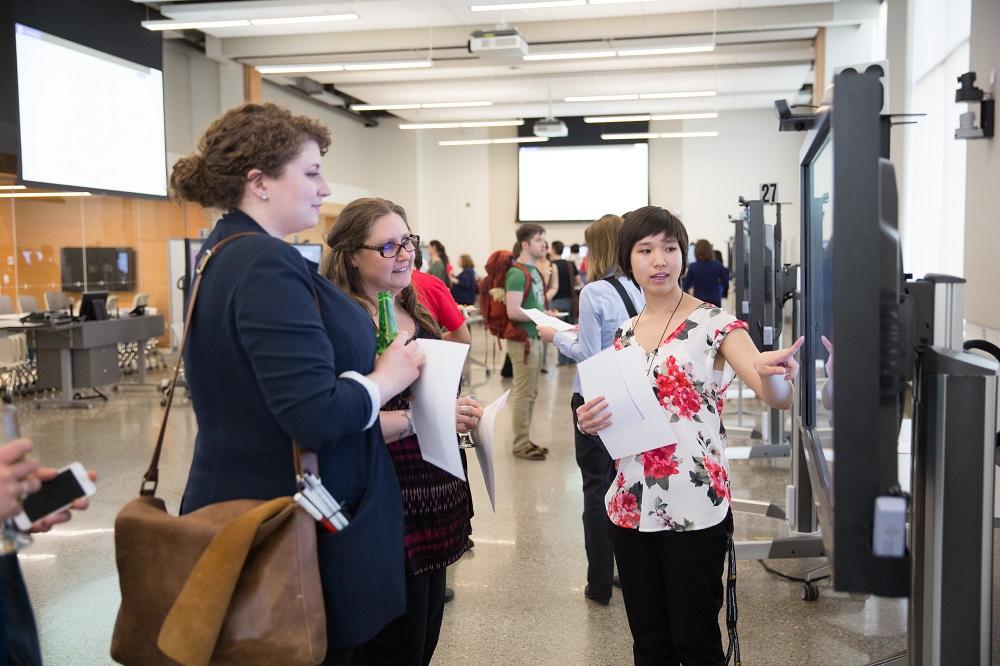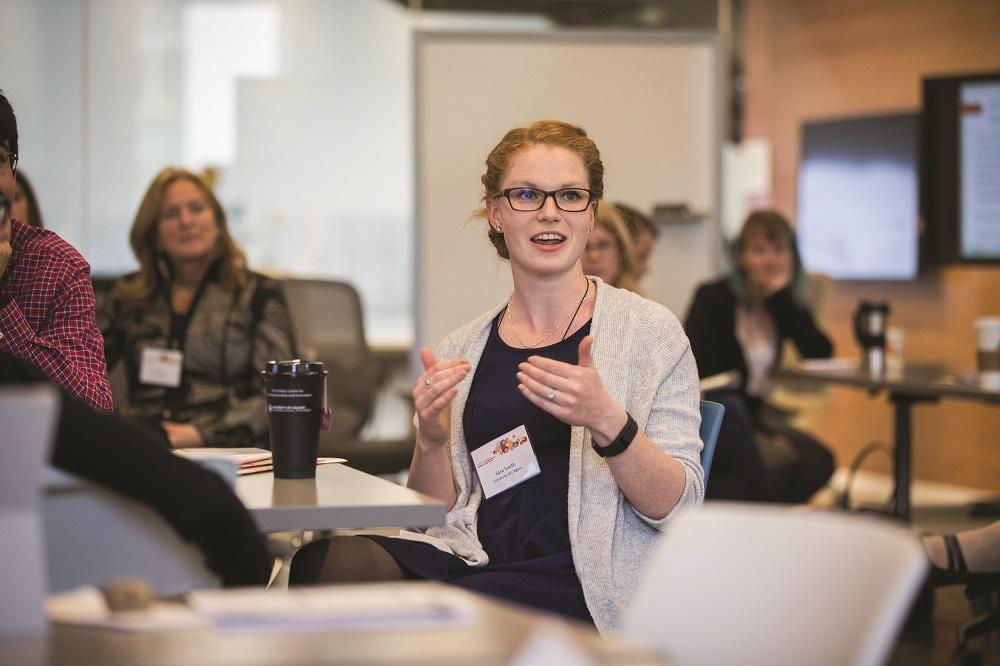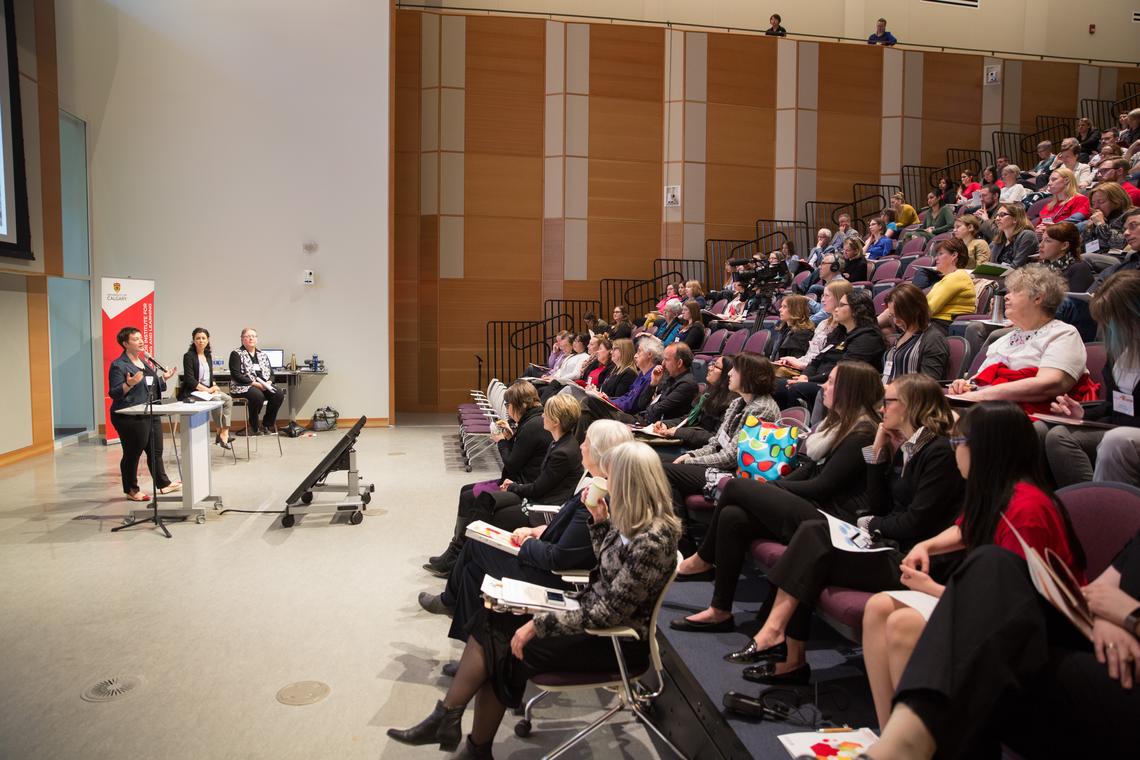April 17, 2018
From 'What will I teach?' to 'What will students learn?'

April 23 is the registration deadline for the 2018 Conference on Postsecondary Learning and Teaching
Adrian Shellard, for the Taylor Institute for Teaching and Learning
The Taylor Institute for Teaching and Learning will host the 2018 University of Calgary Conference on Post-Secondary Learning and Teaching, entitled Students as Creators, Drivers, Innovators and Collaborators, on May 1 and 2.
Acknowledging a shift in emphasis from “teaching” to “learning” occurring in post-secondary education over the past 25 years, the conference will explore student-directed learning through the lenses of scholarship and practice. This theme recognizes the crucial role that students play in motivating positive change.
Reflecting on the movement toward student-focused teaching at the centre of the conference’s theme, director of the Taylor Institute’s educational development unit Natasha Kenny says, “This shift has helped us transition our thinking from ‘What will I teach?’ to ‘What will students learn?’ There is an equally important transformation in our thinking happening in higher education right now — helping us stretch our mindset even further to imagine ‘What will we learn, generate, and contribute to together in our teaching and learning communities?’”

This conference will explore the crucial role that students play in motivating positive change.
Adrian Shellard, for the Taylor Institute for Teaching and Learning
Conference will explore connections between students and instructors
AnneMarie Dorland, a fourth-year PhD candidate in the Department of Communication, Media and Film, will be presenting an interactive session in collaboration with Dawn Johnston (associate dean, teaching, learning and student engagement) and Monica Jean Henderson, a graduate student in the Department of Communication, Media and Film. Drawing from their multifaceted mentorship relationship, this trio will explore the topic of rethinking what mentorship might mean within academic communities.
Dorland has spent a great deal of time thinking about the conference theme, which relates to the basis of her work as an instructor.
“By putting the student at the centre of the learning, we pivot our focus from ‘what I know’ as the teacher to prioritizing the student’s area of inquiry — giving them an opportunity to connect all the amazing things there are to learn with their lives and their critical thinking skills,” she says. “This isn’t easy, and it takes an enormous amount of trust. But in our world of facts-on-demand, shifting our attention to how we facilitate and nurture learning rather than polishing our ‘teaching’ skills is critical to developing a creative and innovative student experience.”
Victoria Bouvier, a second-year PhD student in the Werklund School of Education, will present on the ways she privileged orality in an Indigenous studies course through the use of iterative, reflexive video assignments centring the mind, body and spirit.
“I envision teaching and learning as a reciprocal relationship wherein we are all teachers or learners in differing contexts,” she notes. “My pedagogy is enacted from the understanding that within my ‘classroom,’ students may embody the teacher and I the learner, thus positioning us within a collective orientation on a journey of coming to know. This notion of collectivity does not centre any one of us at the centre of learning, but all of us are equal within the circle, which is premised on the understanding that our process of making meaning is birthed out of our relationships with our selves, each other, and the environment.”

Speakers Isabelle Barrette-Ng and Beth Marquis will reflect on student contributions to campus.
Adrian Shellard, for the Taylor Institute for Teaching and Learning
Keynote speakers discuss student contributions to the campus community
This year’s keynote speakers are Isabelle Barrette-Ng, a senior instructor in the University of Calgary’s biological sciences department and Beth Marquis, associate director (research) at McMaster University’s MacPherson Institute for Leadership, Innovation, and Excellence in Teaching.
Barrette-Ng’s presentation will address her SAGES (SoTL Advancing Graduate Education in STEM) program and the ways that it has successfully cultivated collaborative learning environments for graduate students and faculty mentors. In her presentation Marquis will explore the transformative potential of student-faculty partnership and its connection to wider issues of equity and inclusion on university campuses.
“I’m excited to speak at the conference about the growing body of research and practice focused on student-faculty partnership in course design and delivery and the scholarship of teaching and learning,” Marquis says. “Drawing on an ongoing program of research on which I’m working with colleagues at McMaster University and Bryn Mawr College, I aim to consider further the potential relationships between student-faculty partnership and issues of equity and inclusion in higher education, and to explore what it means to position partnership as a means of creating more egalitarian learning communities. With this in mind, the presentation should speak to the ‘learning partnerships’ and ‘building community’ conference threads.”
Barrette-Ng notes that “including students as partners means that each stage of decision-making in the educational development process is shared equally between learners and teachers.
“Building a community that fosters open, deep and respectful communication among learners and teachers allows everyone in the learning process to contribute ideas for improving the learning environment and creating more effective approaches to learning,” she adds.
Apr. 23 is the registration deadline for Students as Creators, Drivers, Innovators and Collaborators. For more information, visit the conference website.
Learn more about the Taylor Institute for Teaching and Learning.
